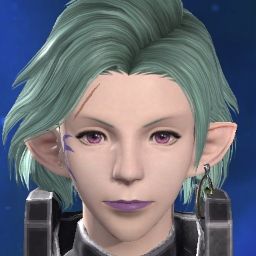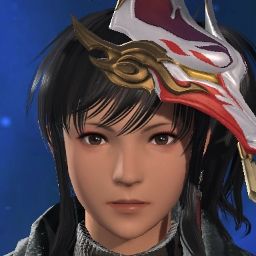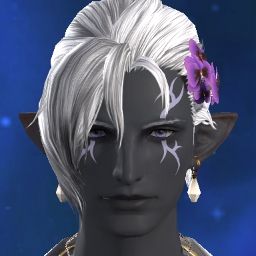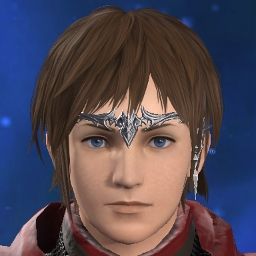It wasn't that bad, but you're broadly on the right track. The Ascians are the most extreme example of FFXIV's writing very rarely ending in the place it started, because the approach is usually to find the plot hooks to justify the story they want to tell. They were locked in on the Ascians being major villains, but they changed track on that story pretty hard; I don't think they had 'no idea who the Ascians were', but rather that the original plan of who they were got thrown out. I honestly very much doubt that the final idea only happened in Shadowbringers, though; it might be where they hit a generally solid state, but my personal estimation is that the 'present Ascians' first started coming into form in Heavensward's patches.
And anyone who thinks that's a negative, remember: every single Ascian fan loved them in Shadowbringers, most likely because of Shadowbringers, and we wouldn't have that without the devs' willingness to have and pursue better ideas.
So yeah, a number of these really old Ascian-related threads are just relics of a version of the Ascians that wasn't their final form. For the most part the developers are really good at repurposing those old pieces, to the point where the playerbase broadly sees those as 'unresolved mysteries' rather than parts of a rejected story (remember how long people banged on about 'what's under Silvertear Lake'), but with the Ascians having been a big part of the story even back in their early form, they just have a lot of bits lying around, and not all of them fit easily into the story we eventually got. After all, if the dark crystal was Zodiark, that would've been a really dull fight.
Thread: Loose threads
-
06-17-2024 09:53 AM #11Player

- Join Date
- Sep 2021
- Location
- Solution Eight (it's not as good)
- Posts
- 3,003
- Character
- Ein Dose
- World
- Mateus
- Main Class
- Alchemist Lv 100
(3)Last edited by Cleretic; 06-17-2024 at 10:32 AM.
-
06-17-2024 12:07 PM #12Player

- Join Date
- Mar 2011
- Location
- Limsa Lominsa
- Posts
- 5,043
- Character
- Anony Moose
- World
- Excalibur
- Main Class
- Arcanist Lv 100
I'm probably going to repeat a lot of what others have said but copying the list and rambling is an easier way to organize my own thoughts.
If I remember right the devs were cited as suggesting it was Zodiark's heart and Fandaniel crunched it. I speculate that early on the idea was for there to be a "Fathercrystal" ... but later they realized that they could lean on the Bahamut Prime approach to make for a much cooler trial boss. Amano demon > Big Ol' Crystal. (I wouldn't be surprised if there was a silent middle stage where the plan was for him to look more like his statue.)
I think fan discourse has muddied this one ever since the "chains / gears of fate" artwork really fed the early doubts in whether Hydaelyn could be trusted. Minfilia cherished her connection to Hydaelyn. I suspect this had something to do with losing her father at such a young age. Knowing the will of the star loves you and sees your worth probably counts for a lot. Hydaelyn reached out to Minfilia, confiding in her the consequences of Her intervention at the Praetorium, and Minfilia chose to stay behind. Minfilia consented to becoming the Word of the Mother, and imho she indicates as much during the 3.4 exploration of Urianger's trespasses. In that era of the story, many inclined to distrusting Hydaelyn chose to simply dismiss Minfilia's consent, believing that the Echo tempered you to Hydaelyn.
Agreed with others that it's likely a mix of- His cold upbringing in the Galvus family
- Garlean cultural values regarding might and right
- The formative experiences of feeling everything was effortless and purposeless until he experienced the rush of striving to overcome an opponent who could best him.
- The swords.
- The machine that gives Garleans magicks
- The machine that gives Garleans magicks being used to give him Resonance
- Possibly the abandoned plot point of whatever Emet-Selch did that was tied into his dreams of the Final Days.
This still appears to be an objective inconsistency in the game itself. We're all looking forward to how that gets cleaned up, whether it's a simple surgical reconstruction of the 2.0/2.3 cutscenes or some clever use of additive/transformative retcons.
(I really hope I'm not opening a can of worms, here, lol...)
Elidibus (or really we should say Themis at this point) was chosen for the Convocation at an age where most are just barely starting adult life. The 5.3 speech, where he's recounting how things went so wrong - in my humble opinion - sounds a lot like he's admitting to an idealistic naivete.
Note that Elidibus, imho, appears to acknowledge the plan was flawed from the start in 5.3. And more certainly Emet-Selch in 6.0 acknowledges their plans would never lead to the defeat of the Endsinger. (He has no regrets about giving his all for his world, mind you; he just understands why he lost.)
But put yourself in Themis's shoes. It's the Final Days, and he has a plan. He's going to save everyone. He's going to emerge victorious from Zodiark and everything will be okay. His friends will be there, smiling down at him, again. And then summoning Zodiark inadvertently tempers the Convocation and locks him into a rigid interpretation of salvation. Some of the populace follows them in a futile effort: to reclaim through the one true god that which can never be reclaimed. Some of the populace backs a plan to summon a counterbalance to shackle Zodiark. Some oppose the summoning of a second deity after the consequences of the first. Civil war erupts.
The role of the Elidibus is to chart the best path forward and unite his people on that path. The Convocation was divided, the populace was divided, and it was the duty entrusted to him to unite them on the right path. That's what I think "reconciliation" means here. That, from his perspective at the time, it greatly pained him to see his people in conflict - to see the plan for their salvation crumbling around him. Despite his age they put their faith in him. He had to make it right. It seemed like the right thing to do at the time.
i.e. I think he said the name of his office to highlight specifically how desperately he felt responsible for performing the role entrusted to him.
The tragedy of Elidibus is that he lost his ability to objectively chart that course. When Emet-Selch dies, "remember us" is as much a message to Elidibus as the Warrior of Light, but he refuses to hear it. He calls Emet-Selch unworthy of being called an Original and laments that he was not there to correct him. Imho, it's meant to be the moment that we realize that he is truly lost and our conflict is inevitable. For me, even the scene (in the short story Ere Our Curtain Falls) where he emerges from Zodiark has an ominous air to it.
This one actually drives me kinda batty, myself. What the Echo is and does has evolved a lot over time and I speculate that future-sight didn't really fit with the original concept for it. However, ask any roleplayer community that ever tried to invent new Echo powers: future-sight is very tempting. It's not hard to see why Matsuno-san might reach for it. The silver lining is that they were able to connect it to Mezaya Thousand-Eyes, the prophet who wrote the Divine Chronicles - the scripture Louisoux studied to predict the coming of the Seventh Umbral Era in the first place. That never really had an explanation, either, so entwining them gives an "intended all along" sort of vibe to it (assuming it was not, in fact, intended all along).Fear...not... You will make...the right choice. And I will see it through.
(I didn't count Fordola. She had Krile's Echo copied onto her and Krile is extremely sensitive to the thoughts of others and the flow of aether in general. The fact that it manifested for Fordola as having enough context to predict an enemy combatant's next move I don't think is technically, in a general sense "seeing the future".)
I wouldn't be opposed to seeing some manifestations of that power that help fill in that gap and make it feel a little more natural that such a manifestation of the Echo might occur.
As far as I know, that is correct.<...> as far as I know, it is only very briefly mentioned in one of Bozja's field notes
Could be! That or Matsuno-san just asked which legions they had the fewest plans for, lol.<...> I think this plot line was supposed to be further explored in 6.0 back when it was still planned to be an Ilsabard expansion
Agreed that this feels like a hastily-abandoned plot thread.
Technically Athena found an auracite and through research made Sabik.
Pandaemonium seemed to be tying a few loose ends together (a skill the team has gotten quite adept at); namely that Ultima is an extradimensional force and the High Seraph from Ivalice was a primal manifestation of that destructive energy given will by moral awe. Athena found auracite. Ivalice found auracite. Hydaelyn bound the High Seraph. We destroyed it. That could have been the end of it.
But Pandaemonium - for reasons yet unknown - spent its last moments opening the door to Ultima and perhaps even Athena having more connections to history than we know.
Does that mean that ULTIMA PRIME is still out there? Are there even more dimensions than we know? Or is it even more abstract than that? Perhaps some force of destruction beyond even Darkness? True CHAOS from beyond the rift that we will one day need to face with the primordial forces of the COSMOS? Light and Darkness empowered by dynamis and wielded as one...!?!?!?!111!?
Who knows.
(Please look forward to it...?)
This one actually had an explanation at the time, it was just anticlimactic for anyone trying to read a lot into it. The intent at the time was that it was a really cool anime-looking scene where you saw yourself through the deluded eyes of a villain beholding the impossible vanquishing of his own righteousness.
If I remember correctly (I'll have to dig up the panel) it was that the original plan for the Ascians was "be in the background doing bad stuff until further notice" and there was a very rough treatment by Maehiro about where that was headed in the 2.0/3.0 era, which was "unlikely to be approved" and ultimately the story went in a very different direction after that.
I like to use the term "no exit strategy" because I don't think "who are the Ascians, what do they want, where do they come from" is a binary lightswitch that flicks from "no ideas" to "fleshed-out backstory". I speculate that they had a few nebulous ideas here and there, and some may have survived longer than others, but ultimately it was "be in the background doing bad stuff" and "something about the original world" until Stormblood.
I think the biggest hint is one of the lingering stand-out oddities: At the very end of Heavensward, when they were already working on the patch series and had Stormblood outlined, Elidibus didn't seem to care at all that Lahabrea was dead aside from the fact that Lahabrea was a useful tool and without him Elidibus would have to do more work himself. It feels like excuses were made for that later (as opposed to that they designed that scene with the eventual reveal of those explanations in mind).
There's also the shifting of how many overlords there were - in 2.3 we were still seeing the full 14 + Elidibus, and as of 2.5 Nabriales was still talking as if only Lahabrea and Elidibus were "of this world" and one overlord was responsible for each shard.
But I agree that it's not inherently bad to have no exit strategy for things that aren't due to come up yet. I joke that there are "George R. R. Martin Problems" (a plan loose enough for its own characters to wander away from) and then there are "Patrick Rothfuss Problems" (a plan detailed enough that - given the inevitable edits and changes to the story as you release it - you have a ton of work to do to make later stuff match earlier stuff, again).(14)Last edited by Anonymoose; 06-17-2024 at 02:10 PM.
-
06-17-2024 04:54 PM #13Player

- Join Date
- Sep 2021
- Location
- Solution Eight (it's not as good)
- Posts
- 3,003
- Character
- Ein Dose
- World
- Mateus
- Main Class
- Alchemist Lv 100
The comparison I always give is to comic books. You've got multiple creatives drifting in and out, all trying to tell what at first appears to be the same contiguous story, but is really every individual writer and artist finding their own ways to contribute and tell the stories that they want to tell, while trying to make it feel like the same characters and the same world.
Long-running TV shows might be a closer comparison, though. I've loved Doctor Who since the revival series, but it's absolutely just a whole cavalcade of different creatives trying to explain why THIS Cyberman episode is completely different from all the OTHER Cyberman episodes, while also linking back to them to a bunch of those episodes to make it clear that these are actually Cybermen and not just their own weirdass thing. And sometimes that's a whole lot of story to work with, and sometimes the fact that they were weak to gold gets simplified or forgotten!(2)
-
06-18-2024 08:17 AM #14Player

- Join Date
- Sep 2022
- Posts
- 103
- Character
- Cassar Leonhart
- World
- Behemoth
- Main Class
- Gunbreaker Lv 100
I love this response! Brings to me a new point of view of Themis that I hadn't even thought about, and I already love Elidibus/Themis as is, so this is super interesting!
When it comes to Zenos, you guys have convinced me that he's just that strong, and/or that the WoL isn't as almighty as I pictured, which is a good way of seeing it, I think. I also liked your point of view of Minfilia, and her knowing full well what she was getting herself into but doing so willingly, this actually makes perfect sense to me, I honestly don't know why I didn't think of it. Overall, I think you really nailed all of my points!
I suppose the only things that will remain on the back of my head are the (potentially) discarded plot line with Zenos' dreams (I still hope one day they explain it ) and also just the future sight stuff, which by the way I'm glad to see someone else shares in my discomfort of them never touching on it again! And yeah, you're totally right, it would be perfect to tie up some ends!
(2)
) and also just the future sight stuff, which by the way I'm glad to see someone else shares in my discomfort of them never touching on it again! And yeah, you're totally right, it would be perfect to tie up some ends!
(2)
-
06-18-2024 08:57 AM #15
-
06-18-2024 11:30 AM #16Player

- Join Date
- Sep 2021
- Location
- Solution Eight (it's not as good)
- Posts
- 3,003
- Character
- Ein Dose
- World
- Mateus
- Main Class
- Alchemist Lv 100
Maybe it says something about me that when I hear this, I don't think the interesting story potential is in Zenos getting magic psychic dreams, it's in Varis NOT getting them. I'm a tiny bit more sympathetic towards him knowing that he's the one guy in his family that's left out of the mysterious big picture, and is clearly looked down on for it! And honestly, it makes a lot of the story around him make a lot more sense!
Only a tiny bit more sympathetic, though. He's still an abject horrifying monster. But I think it puts him above the other Galvuses for me, I'm more interested in the inferiority complex that Varis clearly has than the superiority complex that his son and grandfather have.(5)
-
06-18-2024 07:08 PM #17Player

- Join Date
- Apr 2022
- Posts
- 1,181
- Character
- Wind-up Everyone
- World
- Zodiark
- Main Class
- Arcanist Lv 52
Tangentially related I know, but does golbez also evoke zenos’s catchphrase in other languages? (In the lunar subterranean when looking through the serendipitously resonating memoria crystal, the use of “friend” in his voiced lines, as well as being a giant long haired blonde man seems a bit coincidental to me). If there are other shards of zenos about, then the whole dreaming thing could be emet selch awakening the past memories while bypassing the hydaelyn spam tell.
(0)
-
06-18-2024 07:38 PM #18Player

- Join Date
- Aug 2011
- Location
- Limsa Lominsa
- Posts
- 2,211
- Character
- Midi Ajihri
- World
- Hyperion
- Main Class
- Arcanist Lv 100
IIRC, they just gave a noncommittal answer of “sometimes things skip a generation”. I don’t know if that was them trying to avoid spoiling future story beats or just them handwaving it away but I’m more inclined to lean to the latter since the whole “subplot” if you can even call it that didn’t exactly have a lot of investment and all the entire royal family is dead now so there’s not really any point in picking it back up again.
(0)
-
06-18-2024 08:28 PM #19Player

- Join Date
- Sep 2021
- Location
- Solution Eight (it's not as good)
- Posts
- 3,003
- Character
- Ein Dose
- World
- Mateus
- Main Class
- Alchemist Lv 100
Oh, yeah, no angle of that's going to get explored in the story going forward, and frankly none of the relevant characters are people I want to look back to for an exploration. I'm more just ruminating on the notion that if you did dredge up that bit for a story, I think the best angle is in focusing on Varis.
His entire family is in varying ways part of a massive secret truth about an ancient world that they either came from or have visions of, and created, propagated and benefited from a 'rule of the strongest' worldview basically designed only to serve them... and by random draw of the genetic lottery, he wasn't invited to any of it while still being expected to uphold it. If we were to get more story about any of the Galvuses, I want that, not 'I only get joy through fighting but I'm too good a fighter to enjoy any of it, also I have weird dreams I ignore sometimes'.(1)
-
06-18-2024 08:49 PM #20Player

- Join Date
- May 2023
- Location
- Limsa Lominsa
- Posts
- 1,040
- Character
- Percibel Theren
- World
- Zodiark
- Main Class
- Astrologian Lv 90
Zenos has quite a bit of backstory in the lorebooks that's completely skipped in-game. I might be misremembering but I believe it was heavily suggested somewhere that he was either experimented on himself, or a result of an experiment.
(0)





 Reply With Quote
Reply With Quote




